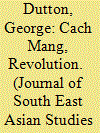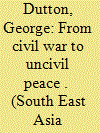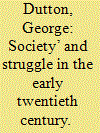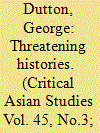| Srl | Item |
| 1 |
ID:
139602


|
|
|
|
|
| Summary/Abstract |
This article traces the etymology of the term ‘revolution’ as it developed in Việt Nam between the second half of the nineteenth and the early twentieth centuries. It argues that the term was slow to catch on, and that activists who used it did so in often contradictory ways. The term's historical development complicated efforts to fix its meaning, and it was not until the later part of the 1920s that it came to be consolidated, in part through Hồ Chí Minh's publication of a short book entitled Đường Kách Mệnh (The road to revolution).
|
|
|
|
|
|
|
|
|
|
|
|
|
|
|
|
| 2 |
ID:
146531


|
|
|
|
|
| Summary/Abstract |
This article examines the role and prominence of the military as the key institution of the new Nguyen dynasty in Vietnam at the beginning of the 19th century. The military had brought the new regime to power during the wars with the Tay Son regime, and the end of the conflict did not end the military’s role. I argue, contrary to existing scholarship which emphasizes the Nguyen as a civilian bureaucratic regime, that the military remained critical to the survival of the new regime. While the Nguyen slowly began the transition to civil rule, the military remained the predominant institution of the dynasty well into the middle of the century. Moreover, I argue that the regime’s military orientation had profound effects on the Vietnamese populations who were subject to conscription and the associated hardships of labor projects and suppression of insurgencies.
|
|
|
|
|
|
|
|
|
|
|
|
|
|
|
|
| 3 |
ID:
142715


|
|
|
|
|
| Summary/Abstract |
At the beginning of the twentieth century, the Vietnamese were confronted with the harsh realities of French colonialism, while simultaneously engaging with a flood of new concepts and the language that came with them. Among these concepts was that of ‘society’, whose import was enhanced by its linkages with the discourse of social Darwinism. This article explores the Vietnamese neologistic project of the early twentieth century through a close examination of the ways in which the concept and labels for ‘society’ were brought in and understood. I argue that the arrival of ‘society’ in conjunction with social Darwinism profoundly shaped the Vietnamese understanding of the term, implicating it in a notion of struggle and contestation. By illustrating the introduction of ‘society’ through early modernist school textbooks I suggest the ways in which Vietnamese conceptualized it as they embarked on their own struggle with the threats posed by colonialism.
|
|
|
|
|
|
|
|
|
|
|
|
|
|
|
|
| 4 |
ID:
123365


|
|
|
|
|
| Publication |
2013.
|
| Summary/Abstract |
This article contributes to recent scholarship on modern Vietnamese historiography by examining the ways in which twentieth-century historians have manipulated their representations of collective actions during the French colonial period. Following studies by Patricia Pelley, Christoph Giebel, Peter Zinoman, and others, the author offers a critical reading of narrative accounts of the period between the late nineteenth century and the late 1930s. The article is inspired by Prasenjit Duara's work on modern Chinese historiography, in which he showed how early twentieth-century Chinese historians viewed their history through the simplifying lens of the nation-state. Here the author argues that most post-1954 communist historians in Viet Nam were influenced by similar impulses, leading them to construct a highly teleological account of this period, obscuring its true complexity. The author uses case studies of the representations of secret societies, ethnic minority groups, and new religious movements to demonstrate how this obscuring has worked, while suggesting alternate readings of the collective actions by these groups that place them outside of a convenient teleology leading directly to the triumph of the Communist Party. The author argues that the complex histories of these groups were a challenge to the Marxist dialectic and were thus regarded as a threat to the narrative. As such, modern historians had to reimagine or even erase these complexities for political purposes. The author concludes by suggesting that historians must continue to probe these types of collectivities as complex actors in a complicated historical landscape, rather than accepting them as part of a linear narrative.
|
|
|
|
|
|
|
|
|
|
|
|
|
|
|
|